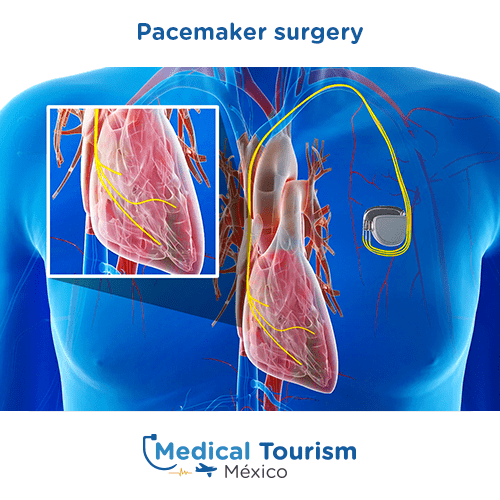The most reliable doctors in Mexico
Pacemaker surgery information and locations in Mexico
Pacemaker surgery is recommended for heart rate or rhythm problems and consists of placing in
the chest a small biocompatible electronic device that sends electrical pulses to help regulate
the heartbeat.
A pacemaker is composed of three parts: a pulse generator, one or more leads, and an electrode
in each lead. When the heartbeat is too slow or irregular, the pulse generator sends electrical
pulses through the leads and electrode.
The procedure is performed under local anesthesia; surgeons make a small incision on the chest where the pacemaker is inserted; the lead is guided through a vein into the heart. The pacemaker and the lead are connected and tested before the incision is closed.
The procedure is performed under local anesthesia; surgeons make a small incision on the chest where the pacemaker is inserted; the lead is guided through a vein into the heart. The pacemaker and the lead are connected and tested before the incision is closed.
Get professional services with the best heart surgeons in Mexico!
Benefits
Long battery time
Improves heart rate
Can be adjusted to your lifestyle
Improves life expectancy
Improves heart rate
Can be adjusted to your lifestyle
Improves life expectancy
Includes
Pacemaker and its components
Pacemaker surgery
Procedure:
2 hrs.
Hospital stay: 1 hr.
Cleared to fly: 2 - 3 days
Hospital stay: 1 hr.
Cleared to fly: 2 - 3 days
After surgery
Out of town patients do not require follow-ups with the cardiovascular surgeon after the procedure. Patients are
clear for flying after 2 - 3 days from the pacemaker surgery. Back at home, the patient can go with any physician to
remove sutures.
Note: Follow-ups can be arranged as face-to-face or virtually. If needed, you can go to your primary care physician to remove sutures or get medication adjustments.
As an Amazon Associate, we earn from qualifying purchases.
Take a look at one of our medical tourism essentials for cardiology procedures.
Take a look at one of our medical tourism essentials for cardiology procedures.
Additional images
View additional images for this procedure.

View more


Locations
Select the city of your choice to seethe doctors profile.
Ciudad Juarez, Chih.
Dr. Javier A. Torres
View more

Pacemaker surgery frequent questions
Get answers to our most frequently asked questions and what to expect after the surgery.
Am I a candidate for pacemaker surgery?
Candidates for surgery usually experience a slow heartbeat that results in shortness of breath, less energy or even in heart failure.
Will the surgery be painful?
Doctors use local anesthesia to numb your chest, so you don’t feel pain, however, you will be awake during the procedure. You could feel some pressure around the area where the specialists are working.
What happens after surgery?
After surgery, you will have to stay at the hospital to continue being monitored. After returning home you might find some bruising at the site of the incision. Some patients can feel uncomfortable when lying in certain positions.
When do I need to replace the batteries?
Battery life is expected to be around 5 to 15 years. When the battery runs out of energy it needs to be replaced with a simpler surgical procedure that needs less recovery time.
What are some precautions I need to take after surgery?
Some devices may affect your pacemaker’s regular functions when being exposed to them for longer periods; such as microwaves, metal detectors or high-voltage transformers. Also try to avoid placing your cellphone directly over your pacemaker.
Recent news
Article
Stabilizing my heart rate with surgery in Guadalajara
Kurt Schaefer on September 13, 2021

Disclaimer: This information does not reflect the medical advice from our clinics. All cases are different and this treatment may not suit you. Always refer to a medical professional with the certification and experience. All of our physicians are fully qualified to perform these procedures. For more information and diagnosis contact one of our top specialized clinics.
In all medical procedures, there are chances of complications, the specialist will provide you detailed information about the risks of the procedure, talk to the specialist directly.
In all medical procedures, there are chances of complications, the specialist will provide you detailed information about the risks of the procedure, talk to the specialist directly.





